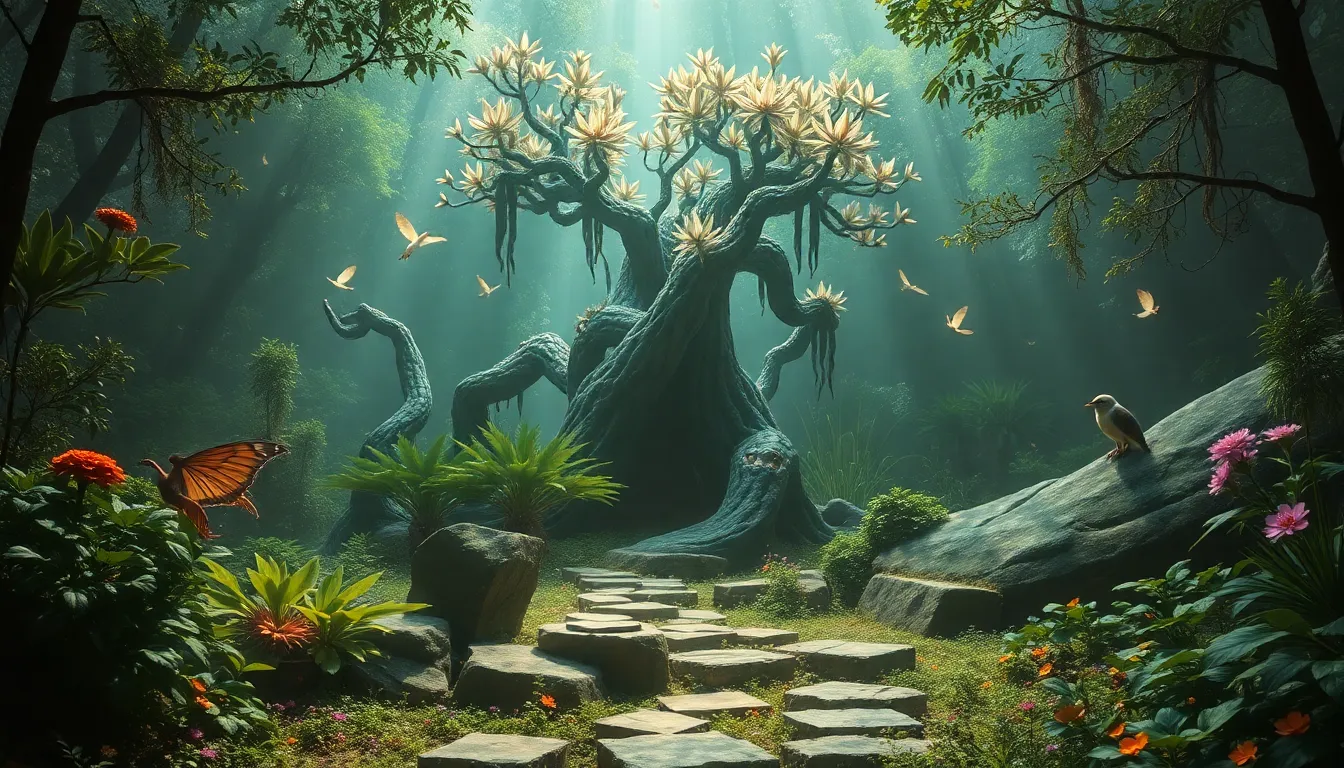The Mythical Gardens: Cultivating Sacred Spaces
Introduction to Mythical Gardens
Mythical gardens have long captured the imagination of cultures around the world. These sacred spaces are more than just a collection of flora; they represent a deep connection to nature, spirituality, and the divine. Often depicted in literature, art, and mythology, these gardens serve as a refuge for contemplation, healing, and inspiration. This article aims to explore the significance of mythical gardens across various cultures, their historical context, and the ways in which we can cultivate our own sacred spaces.
Historical Context of Sacred Gardens
Throughout history, gardens have played a pivotal role in the lives of civilizations, serving as a symbol of prosperity, beauty, and spiritual significance. Ancient civilizations such as Mesopotamia and Egypt revered gardens as sacred spaces.
- Mesopotamia: Known for the Hanging Gardens of Babylon, one of the Seven Wonders of the Ancient World, these gardens were believed to be a lush paradise, symbolizing human ingenuity and the divine.
- Egypt: The ancient Egyptians cultivated gardens for both aesthetic pleasure and religious practices. They believed that gardens were gateways to the afterlife, providing nourishment and pleasure for the soul.
Moreover, gardens have often been associated with religious and spiritual practices, serving as places for meditation, ritual, and connection with the divine.
Symbolism in Garden Design
The elements found in mythical gardens are rich with symbolism, often reflecting deeper spiritual truths and cultural beliefs. Common features include:
- Water: Symbolizing life, purity, and renewal.
- Stone: Representing permanence, strength, and the Earth itself.
- Flora: Each plant carries its own meaning, from healing herbs to flowers symbolizing love and beauty.
These elements vary across different mythologies, but they consistently evoke themes of balance, harmony, and interconnectedness.
Famous Mythical Gardens in Literature and Art
Mythical gardens have been celebrated in literature and art for centuries. They often serve as metaphors for human experience and the search for meaning.
- The Garden of Eden: In Judeo-Christian tradition, this garden represents paradise and the origins of humanity, embodying innocence and divine creation.
- The Secret Garden: Frances Hodgson Burnett’s novel portrays a hidden space of transformation and healing, emphasizing the restorative power of nature.
In art, gardens have been depicted in various styles, from the serene landscapes of Claude Monet to the intricate details of Persian miniatures, each conveying a unique interpretation of beauty and divinity.
Creating Your Own Sacred Space
For those inspired to cultivate their own mythical gardens, here are some practical steps:
- Choose a Location: Find a quiet space in your yard or a balcony where you can connect with nature.
- Decide on a Theme: Reflect on what spirituality means to you and select plants and elements that resonate with your beliefs.
- Select Plants: Incorporate a mix of flowers, herbs, and trees that have personal significance or traditional spiritual meanings.
- Add Elements: Consider including water features, stones, or sculptures that enhance the atmosphere of your garden.
The Role of Nature in Spiritual Well-Being
Engaging with nature in a mythical garden can yield numerous psychological and emotional benefits. Studies have shown that spending time outdoors can:
- Reduce stress and anxiety.
- Improve mood and overall mental health.
- Enhance feelings of connectedness and purpose.
Additionally, mythical gardens can serve as a backdrop for mindfulness practices, encouraging individuals to be present and attuned to their surroundings.
Cultural Variations: Sacred Gardens Around the World
Across the globe, various cultures have developed unique interpretations of sacred gardens:
- Japanese Zen Gardens: Emphasizing simplicity and tranquility, these gardens use rocks, sand, and minimal plant life to create a meditative environment.
- Islamic Gardens: Known for their intricate designs and water features, these gardens symbolize paradise and are often divided into four quadrants.
- Native American Sacred Spaces: Incorporating native plants and elements of the land, these gardens reflect a deep respect for nature and spirituality.
Each garden type carries its own philosophies and approaches to the sacredness of nature.
Mythical Gardens in Modern Society
In today’s fast-paced urban environments, there is a resurgence of interest in garden spaces as sanctuaries. Community gardens have become popular for:
- Fostering a sense of belonging and community.
- Providing fresh produce and promoting sustainability.
- Creating green spaces that enhance urban living.
These gardens not only beautify the surroundings but also serve as communal areas for sharing, learning, and connecting with nature.
Environmental Considerations
As we cultivate mythical gardens, it is essential to adopt sustainable gardening practices:
- Use native plants that require less water and maintenance.
- Implement organic gardening techniques to reduce chemical use.
- Encourage biodiversity by creating habitats for various species.
By prioritizing ecological balance, we can ensure that our sacred spaces contribute positively to the environment.
Conclusion: The Enduring Legacy of Mythical Gardens
The allure of mythical gardens transcends time and culture, offering a sanctuary for reflection, creativity, and connection with nature. As we explore the beauty and significance of these sacred spaces, we are encouraged to create our own personal gardens that inspire tranquility and rejuvenation. Embracing the principles of mythical gardens can lead to a deeper understanding of ourselves and the world around us, reminding us of the timeless relationship between humans and nature.




